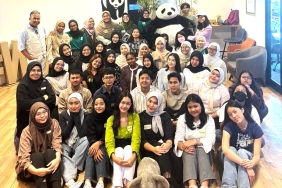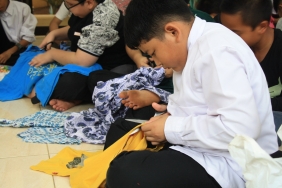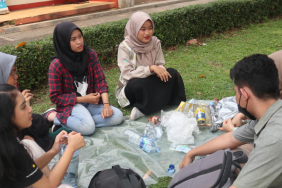HSBC VOLUNTEERS AND MEDAN RESIDENTS LEARN TO PROTECT WATER AT WATER WALK EVENT
Earth Day is a momentum for us to care more about the environment. One way to show our love for nature is shown by WWF-Indonesia and HSBC in the form of a Water Walk event. The event was held at Cadika Pramuka Park, Medan Johor, Medan City, North Sumatra on Sunday (28/4) morning. The event aimed to share knowledge about water and the environment with participants consisting of HSBC staff and the general public.
The event began with a description of the water conditions in the world. According to WWF-Indonesia's Water Specialist, Agus Haryanto, of all the water on Earth, about 97% is seawater, while 2% is ice at the north and south poles. "And only 1% of the water we can use daily," Agus said.
Agus further explained that the amount of water on Earth will not decrease or increase, but the quality can change. The decline in water quality is caused by massive waste that pollutes rivers. This will affect biodiversity, the environment and humans. So, with the momentum of Earth Day, Agus invites the community - especially Medan residents - to make various efforts to maintain water quality. "Starting from simple things, namely saving water and not throwing garbage into the river," he said.
In fact, Medan residents themselves have witnessed the destruction of various watersheds in North Sumatra, one of which is the Deli watershed. Currently, the Deli River is not functioning as it should. The forest area in the upper reaches of the Deli River is only 3,655 hectares. Or, in other words, the remaining forest is only 7.59 percent of the 48,162 hectares of the Deli watershed area. In fact, the Deli watershed should have a water catchment area of 140 hectares, or 30 percent of the watershed area.
The destruction of forests around the watershed is due to the conversion of the green belt into plantation areas, settlements and shops. As a result, the watershed always overflows, causing flooding every rainy season.
After all participants received information about the condition of water and rivers, the activity continued with a Water Walk. This edutainment program aims to invite all participants to learn and know the quality of water used in daily life. The conversation about water was opened with a question about the need for water for a cup of coffee asked by WWF-Indonesia's Freshwater & Energy Policy Officer, Nanda Mariska. The question was responded to by Elvin Gumati, one of the HSBC staff, "I think a cup of coffee requires 10 liters of water!" Apparently, the answer to the question is quite astonishing. According to Nanda, the water needed to make a cup of coffee from planting, harvesting to brewing is 140 liters. Then, participants were invited to follow the water testing process. This is a rare experience for some people. No wonder the participants were enthusiastic about the activity. In this testing post, they can see for themselves the bacteria or microbes contained in water through a microscope. "Even in clean water, there are certain types of bacteria or microbes to ensure that the water is suitable for consumption," Agus Haryanto explained. In addition to observing microbes, participants were also invited to test the acidity and basicity of water. Before starting the test, participants were given basic knowledge that water that is suitable for consumption has the criteria of odorless, tasteless and colorless. In addition, the water consumed should not be too acidic or too alkaline. "With litmus paper, we can determine the acidity and basicity of water. Consumed water should be neutral with a PH value equal to seven," said Chick Rini, Communication Officer of WWF-Indonesia. This activity has provided many benefits for the participants. "We can learn more about water usage, as well as the easiest way to preserve water," said Wardianto, one of the HSBC staff. Participants hope that this activity can be held again in the future so that Medan residents are more concerned about the environment.





